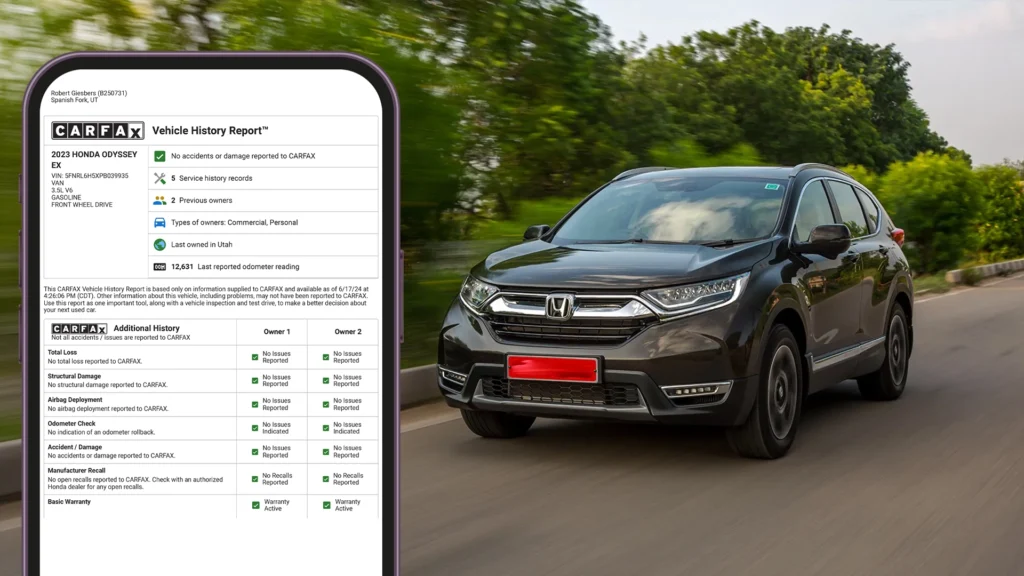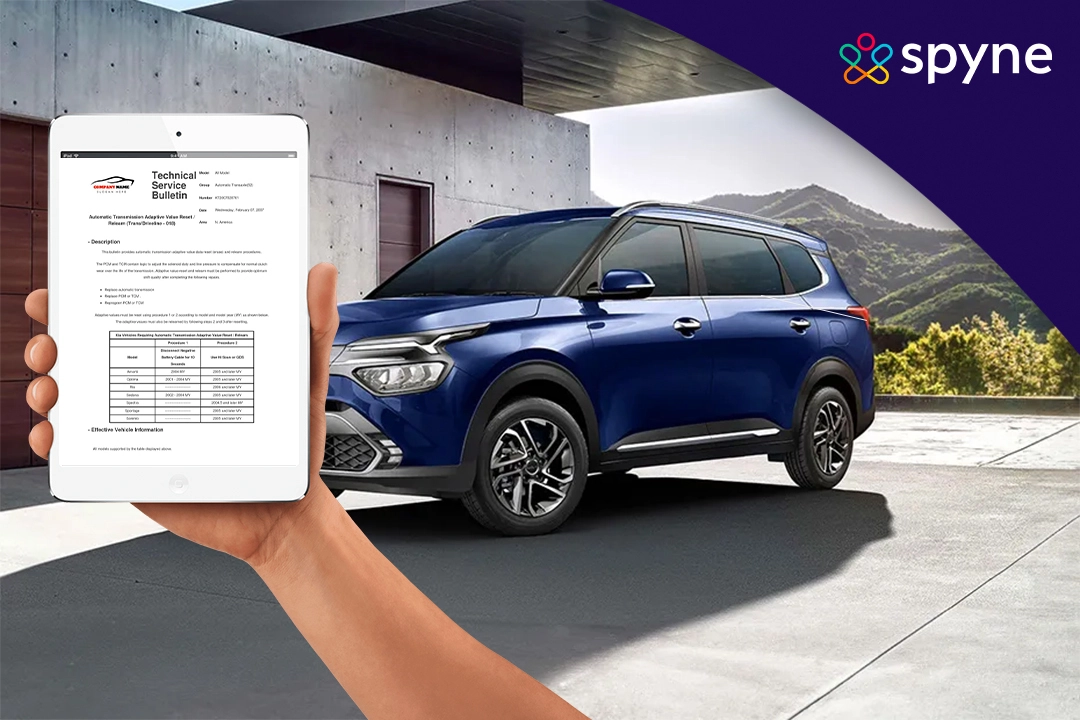If you have ever shopped for a used car, chances are you have come across Carfax. This American company is known for providing vehicle data, with its most popular product being the Vehicle History Report. Beyond just reports, Carfax offers vehicle listings, valuation, and buying and maintenance advice. But what if you’re looking for anything better than Carfax?
Whether you are hunting for a bargain or simply exploring other options, several great car reports cheaper than Carfax. Read on to find the best free Carfax alternatives!
What is a Carfax Alternative?
Carfax provides a vehicle history report, in which there is a detailed history of a specific vehicle. The report includes information on accidents, repairs, ownership history, and more. It is created using data from various sources such as insurance companies, state DMVs, and auto repair shops. But Carfax is not the only company that does this job. AutoCheck, Carfax’s main rival, is considered the best Carfax alternative that is out there. AutoCheck provides information including car registration, technical support, completed work, sales, accidents, and facts about being in natural disaster areas.
Carfax VS AutoCheck: A Comparative Analysis
When you are buying a used car, it’s important to know as much as possible about its history. Vehicle history reports from Carfax and AutoCheck use the Vehicle Identification Number (VIN) to give you a short at-ease vehicle inspection and detailed information about a car’s past. Here’s a comparison of these two popular services:
Carfax
Carfax is part of S&P Global Inc. and has been collecting information about vehicles since 1986. It provides detailed reports, which include:
1) Accident History
2) Ownership History
3) Title History
4) Mileage Information
5) Service and Maintenance Details
6) Recall Information
7) Motor Type
8) Basic Equipment
Carfax cost is $44.99 for one report, $64.99 for three reports, and $99.99 for five reports. It’s especially useful for ordinary buyers looking for detailed history and maintenance records. Recently, Carfax teamed up with General Motors, allowing General Motors dealers to show Carfax reports for their cars. This partnership gives buyers access to the history of new, used, or certified pre-owned General Motors cars through Carfax.
AutoCheck
AutoCheck, part of Experian PLC, also provides vehicle history reports. It costs $24.99 for one report and $49.99 for five reports, which is comparatively a cheaper and best alternative to Carfax. Carfax alternative AutoCheck’s reports cover most of the same information as Carfax, except for service and maintenance details. AutoCheck reports are particularly good for tracking auction cars and provide a unique car scoring system, rating the car’s condition on a scale from 75 to 90. It is a cost-effective option and is considered reliable for tracking a vehicle’s accident and emissions history.
Both AutoCheck vs Carfax offer valuable information, but they cater to slightly different needs: Carfax is better for ordinary buyers who want detailed history and maintenance records. It is more comprehensive and slightly more expensive. Whereas, AutoCheck is good for tracking used cars in car auctions with a unique car scoring system. It is more affordable but less detailed on maintenance.
An Overview of the Global Automotive Industry
The global automotive manufacturing sector is one of the biggest industries worldwide and each year, around 60 million vehicles are produced. This industry is responsible for about 50% of the world’s oil consumption and directly employs 4 million people, with many more jobs created indirectly.
The automotive sector is crucial for economic development. It makes up about 3% of the world’s GDP, and in countries like China and India, this number goes up to 7%. Car manufacturing doesn’t just stand alone; it supports many other industries like steel, glass, and parts manufacturing. These industries often set up near car factories, creating clusters that boost local economies. Examples of such clusters can be seen in Detroit, USA, Guangzhou, China, and Chennai, India.
Car manufacturing has also changed how we move. It has made it easier for people and goods to travel, leading to the growth of suburbs and new business opportunities. According to Market Research Future, the global automotive industry was worth $4.07 trillion in 2024 and is expected to grow to $6.95 trillion by 2032. The Asia-Pacific region, especially China and India, is expected to grow the fastest.

The future of used car market is full of potential. Global Market Insights reported that the used car market was valued at $1.5 trillion in 2022 and is expected to reach $2.6 trillion by 2032. Used cars are popular because they are more affordable, and the rise of digital platforms helps buyers by providing car listings, comparisons, and vehicle history reports.
Vehicle history reports are necessary when buying a used car. They provide important information about the car’s past, such as previous owners, accident history, and maintenance records, helping buyers make informed decisions.
Amazon is also entering the car sales market. Starting with Hyundai, Amazon plans to allow car sales on its platform by the end of 2024. This move is expected to change the car-buying experience and increase the demand for reliable vehicle history reports. Alternative providers to Carfax are becoming popular, offering competitive prices and detailed reports. These alternatives help buyers find reliable, affordable used cars with confidence.
Key Players in the Automotive Industry
Mercedes-Benz Group AG
Mercedes-Benz Group AG, from Germany, is well-known for making and selling luxury cars and vans. They also provide services like car financing, leasing, subscriptions, and fleet management. On April 25, Mercedes-Benz introduced the new Mercedes AMG E 53 hybrid 4MATIC model. These new cars, available as a saloon or an estate, have an AMG speedshift 9G transmission. You can buy them from retail partners, with prices starting at 109,242 euros for the saloon and 111,741 euros for the estate.

Nio Inc.
Nio Inc. is a leading Chinese company that makes smart electric vehicles. They focus on creating and selling advanced electric cars, powertrains, and batteries. Some of their popular models are the eT7, eT9, eC6, and eS6. On February 26, Nio announced a partnership with Forseven Limited, giving Forseven a license to use Nio’s technology and software. This license allows Forseven to use Nio’s tech worldwide, in return for a technology license fee.
Honda Motor Co., Ltd.
Honda Motor Co., Ltd., based in Tokyo, Japan, is a major global car manufacturer. On April 25, Honda shared its plans to build a fully electric vehicle supply chain in Canada. They plan to invest around CAD 15 billion, including joint ventures, to get ready for the rising demand for electric cars in North America. Honda aims to start producing electric vehicles in 2028. Once the plant is fully up and running, it will be able to produce 240,000 electric vehicles each year.
10 Best Carfax Alternatives to Check Vehicle History
When it comes to buying a used car, having access to a detailed vehicle history report is essential. A used car buying guide can come in handy too. Many car buyers are on the lookout for Carfax similar companies that offer the same and better services at a lower cost. These Carfax substitutes can help you make informed decisions without breaking the bank. Here are the ten best cheap alternatives to Carfax you should consider:
1) AutoCheck
AutoCheck sites similar to Carfax are a top choice for checking car history. It costs $24.99 for one report and $49.99 for five. The service provides car score ratings and detailed history, helping users make informed decisions.
2) Bumper
Carfax vs Bumper, is another great option for vehicle history reports. It has run over 1 million reports and offers a subscription model for just $1 per month, which lets you run up to 50 reports.
3) EpicVin
EpicVin charges $14.99 for a single report, $7.04 per report for four reports, and $5.40 per report for sixteen reports. The reports include details like accident checks, total loss estimates, ownership history, and more.
4) VINCheck.info
VINCheck.info offers free vehicle history checks. It provides information like vehicle specs, safety ratings, equipment details, fuel efficiency, market value, recalls, warranty checks, and sale history.
5) VinDecoderz
VinDecoderz allows unlimited free and detailed vehicle history checks. They also have a basic VIN check service for simple background information.
6) NICB VIN Check Lookup
The National Insurance Crime Bureau’s VIN Check Lookup is a free service to check for insurance theft and other vehicle history details. It allows up to five searches per day per IP address.
7) VinAudit.com
VinAudit.com is the seventh-best Carfax similar site. It costs $9.99 for a single report, $19.99 for five reports, and $29.99 for ten.
8) Vehicle.Report
Vehicle.Report offers free vehicle history checks using VIN and license plate information. It ranks eighth among Carfax competitors free.
9) Vinsmart
Vinsmart is the ninth-best carfax alternative for vehicle history reports, charging $9.99 per report with discounts for multiple reports. Their reports include title history, vehicle value history, damage and salvage checks, and lease checks.
10) VIN Check Pro
VIN Check Pro is ranked tenth among Carfax equivalent free. It offers free vehicle history reports that include safety ratings, accident history, vehicle problems, total loss records, and theft checks.
Essential Considerations When Choosing a Carfax Alternative
When choosing a vehicle history report service or Carfax alternative you must consider that you are getting comprehensive and accurate information about a used car.
1) Data Sources & Coverage
You must prioritize the importance of up-to-date and reliable information from reputable entities. As it provides a clear picture of the potential issues and the vehicle’s history. Sources like maintenance and service records, police reports, auction reports, insurance companies, and DMV records ensure comprehensiveness and accuracy in the report. Additionally, confirm the geographic coverage of the service, especially if the vehicle has moved between countries and states to ensure it encompasses all areas where the car has operated.
2) Cost and Value
Consider the service’s pricing structure, including subscription options and cost per report. Additionally, compare prices with the offered features to determine the best value for your needs.
3) Report Content
To assess a vehicle history report provider, it’s crucial to examine the specific information included in their reports.
- Accident History: Look past accident details including the location and severity of damage.
- Title Information: Make sure that the report provides information on title issues like flood damage, rebuilt, and salvage titles.
- Odometer Readings: To detect the potential rollback fraud, check the consistency in odometer readings.
- Ownership History: Inspect the information on the past owners, the duration of past ownership, and the type of use (fleet, rental, personal).
- Recalls and Safety Information: Check for any safety issues or open recall issues associated with the car.
4) Customer Support and Reputation
Consider the level of consumer support provided by the service. Look for options like email support, live chat, or phone assistance to address any concerns or questions. Additionally, research ratings and customer reviews to gauge overall service reliability and satisfaction. It will help you to choose a provider with a strong automotive reputation management for trustworthiness and accuracy.
5) Additional Features
You must consider features like access to maintenance records, assistance in making an informed decision on a used vehicle purchase, availability of a mobile app, potential future maintenance needs, and insight into the vehicle’s past to enhance the value of overall service. These features contribute to a user-friendly and comprehensive experience.
What is a Vehicle History Report & Which One is Best for You?
A vehicle history report is a collection of records, that can tell you what happened in a vehicle’s past. It provides information about a used car that may affect your decision to buy a car or how much to pay for it. These records are collected from thousands of sources such as DMVs, vehicle inspection stations, service departments, auto manufacturers, police departments, official car dealers, insurance organizations, and car bidding. These reports may help you answer some very important questions like how many owned that car? Was the car ever involved in a collision? Has the car had up-to-date inspections? And more.
The report will give you details about significant events that will help you better understand the car and one should definitely consider before buying the car. The information these reports provide is as such:
1) Major Accident & Damage
2) Multiple Owners & Length of Ownership
3) Mileage Rollback & Rollover
4) Structural Damage
5) Service History
6) Warranty & Recall Information
There are multiple reasons why you should consider getting a vehicle history report and should be at the top of your to-do list when shopping for a used car. Following are a few reasons why you should get one:
1) Accidents and Damage
A vehicle history report will inform you of any accident the car has been involved in, as it is crucial information you should know if you are planning on buying it. It includes everything, from minor to major collisions. This can help you determine whether has been properly repaired or not.
2) Ownership History
The report will provide information on the number of previous wonders and the time period each owner kept the vehicle. This will give an idea of how an owner maintained that car.

3) Service and Maintenance Records
The report will show the service and maintenance records of the car, giving an idea of how well the car has been cared for over the years. It will include routine oil changes, time rotations, and more significant repairs. It is essential to know if a car was regularly serviced.
4) Title Information
The title of a vehicle tells a lot about its history, and a vehicle’s history report provides information on any title change. It can include salvaged or rebuilt titles, which may indicate past severe damage.
5) Mileage Accuracy
A vehicle history report will verify the accuracy of the mileage reading on the odometer. Odometer fraud, where the mileage is rolled back to make a car appear less used than it actually is, is a common scam. Ensuring the mileage is accurate helps you assess the car’s wear and tear and its remaining lifespan.
6) Make Informed Decisions
With all the information provided in a vehicle history report, you can make a more informed decision about whether to purchase the car. Knowing about any past accidents, ownership history, maintenance records, title changes, and mileage accuracy allows you to weigh the pros and cons effectively and avoid potential future issues.
Conclusion
While Carfax is popular for vehicle history reports, there are plenty of other options out there. If you’re looking to save money or just want to see what else is available, alternatives like AutoCheck provide detailed vehicle information of cars in the used car marketplace that can help you make a smart choice. So, explore your options, do your homework, and find the best fit for your car-buying needs.
Happy hunting!




















